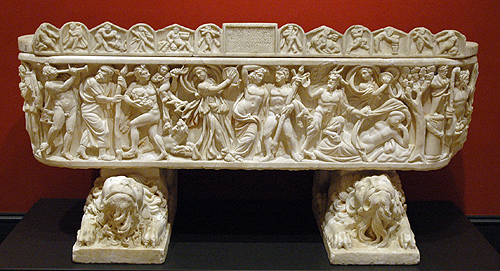I have been watching the TV show The Walking Dead, excellent by the way, and I came to wonder the specific historical background behind the Zombie character. It is fairly well known that there are origin stories in the traditions of South America but as a Graeco-Roman historian I wondered also about European origins.
Zombie comes from the Haitian Creole ‘zonbi’ or the North Mbundu ‘nzumbe’ expressing the idea of an animated corpse being brought back to life. However, originally it was used in the metaphoric sense to describe someone bereft of consciousness. West African Vodun tenets explain that a corpse can be reanimated by a sorcerer to whom they remain in control with no personal will. Funnily enough there is also the idea of a zombie astral where these animated beings are kept in bottles to sell for luck quite like the idea of a genie. South Africa also has the idea of zombies where some places believed that one can be created by a child through the use of the right words of power. The Tibetans have the idea of a Ro-Langs meaning literally a corpse that rises up created by a spirit or magician which cannot bend at the joints. The Chinese interestingly also have the idea of the Kiangshi which was known as a ‘hopping’ vampire or zombie.
 Let us now look into Greek mythology; the idea of the undead becomes more varied throughout time and locations, in the case of Greece the closest we get are probably the Keres who were female death-spirits. They were the daughters of Nyx, sisters of fate, death and sleep among others. While in contrast to other ideas of zombies, the Keres were wilful creatures, they express the similar and time long idea of the dark and frightening side of death and the end of humanity which is personified throughout history and literature. For instance, the dead rising from their graves in Revelations. The Keres had that thirst for flesh and blood that we see in popular fiction, brought death with an association with Cerberus and are mentioned throughout Greek literature including: Homer’s Iliad IX.410ff and the Odyssey XII.158. Additionally the Keres had connection to battles as deities of war choosing those who shall meet their doom. Some have chosen because of this to compare them to Valkyries but where as Valkyries are benevolent, Keres are definitely depicted as malevolent and this idea is where the Keres get their name from; Keres ‘choice’.
Let us now look into Greek mythology; the idea of the undead becomes more varied throughout time and locations, in the case of Greece the closest we get are probably the Keres who were female death-spirits. They were the daughters of Nyx, sisters of fate, death and sleep among others. While in contrast to other ideas of zombies, the Keres were wilful creatures, they express the similar and time long idea of the dark and frightening side of death and the end of humanity which is personified throughout history and literature. For instance, the dead rising from their graves in Revelations. The Keres had that thirst for flesh and blood that we see in popular fiction, brought death with an association with Cerberus and are mentioned throughout Greek literature including: Homer’s Iliad IX.410ff and the Odyssey XII.158. Additionally the Keres had connection to battles as deities of war choosing those who shall meet their doom. Some have chosen because of this to compare them to Valkyries but where as Valkyries are benevolent, Keres are definitely depicted as malevolent and this idea is where the Keres get their name from; Keres ‘choice’.
In Roman mythology we see the Lemures who again were spirits of the malignant dead personified in the likes of Horace and Ovid’s Fasti. Again though the Lemures are willful creatures, rather than the will-less undead of the Haitian and African traditions, being vengeful. They were believed to be created when an individual was not afforded a proper burial or mourned by the living or given tomb offerings. Additionally though Ovid expresses them as ancestral gods or spirits of the underworld.

The Norse traditions have the Draugr who shares many traits of the modern fictional character. They were literally ‘ones who walks after death’ or spirits that inhabited the graves of the dead and animated the bodies. Like in much of popular culture they carry the stench of decay and retain only some sense of intelligence only in the suffering that they cause, devouring the flesh of the living and being immune to weapons. Strangely though the Norse believed that Draugr could increase their size at will and had superhuman strength and some maintain more intelligence with magical abilities. Examples of binding spells have been found on Norse Runestones to keep the dead in their graves.
There are many other examples of similar ideologies and traditions relating to both the Zombie and Vampire myths, often overlapping. In fact there are far too many to list and discuss here. But it is always interesting to explore origin stories in order to understand the human side in the supernatural; the natural and evolved fears and dreads embedded in the Human psyche that have exhibited themselves in similar but varying ways throughout the world.
~graecomuse.wordpress.com


No comments:
Post a Comment